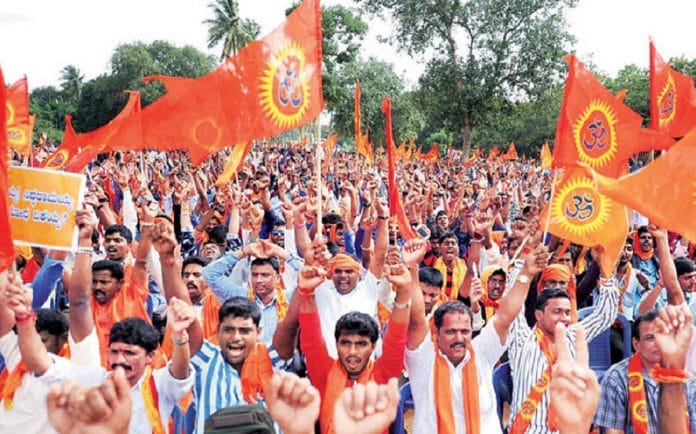Self-styled ‘Hindutva warriors’ have recalibrated their strategy since the BJP suffered a crushing blow in the 2013 polls in coastal stronghold following the 2009 pub assault on women.
Mangaluru/Udupi: Women are back in pubs in Mangaluru. So are couples on the roads in this port city of Karnataka that has been a hotspot for moral policing brigades and Hindu chauvinist groups such as the Sri Ram Sene and the Bajrang Dal.
Thanks to these outfits, Mangaluru has been in the news for all the wrong reasons: Attack on women in a pub, assault on inter-faith couples (two such incidents involving Muslim companions took place in January), vandalism at churches, and cow vigilantism, among others.
However, these fringe elements have now put their moral policing on hold, and are seeking political legitimacy by either actively canvassing for their political patrons or by fielding their own candidates for the 12 May assembly election.
Mangaloreans, meanwhile, seem to have chosen to look the other way and are eager to move on.
On Tuesday evening, the ambience at the Froth N Top pub at Balmatta was far removed from the hustle and bustle of politics. Hours before, about 60 km from here, Prime Minister Narendra Modi had addressed a rally in the temple town of Udupi, criticising the state’s Congress government for the “ease” with which over two dozen BJP (read Hindu) workers were “murdered”. But the young crowd at Froth N Top seemed to have other concerns.
Changed ways
A couple from Canara college was bemused to hear questions about politics, the Sri Ram Sene and the Bajrang Dal. “They must be busy with elections,” quipped the man before the two walked away.
The remark was obviously intended to get rid of an intrusive reporter but he wasn’t wrong. In coastal Karnataka, fringe elements are busy preparing for what they consider a do-or-die battle. Explaining the stakes in the 12 May poll, Vishva Hindu Parishad (VHP) Mangaluru division secretary Sharan Pumpwell told ThePrint that the Congress government had withdrawn 1,600 cases against activists of the PFI – Popular Front of India, an allegedly radical Muslim organisation – while “400 cases have been registered against us”.
He said VHP workers and his former Bajrang Dal colleagues were going door-to-door to canvass for BJP candidates so that “Hindus and our holy cows could be protected”.
Trying to gain some sort of political legitimacy, the Sri Ram Sene, which hit national headlines in 2009 for dragging women out of a local pub and beating them up, has a new patron.
Its members are contesting the assembly polls on the symbol of the Shiv Sena. “Modiji is okay but the BJP is not the same any longer when it comes to promoting Hindutva causes. Has it done anything for the construction of the temple in Ayodhya even though it’s ruling in both New Delhi and Lucknow?” said Sri Ram Sene general secretary Anand Shetty Adyar, who owns a real estate business. “We are now with the Shiv Sena.”
The Shiv Sena and the BJP have been uneasy allies for the past few years, with the former announcing recently that it would contest the 2019 Maharashtra and Lok Sabha elections independently.
The political affiliations of these groups notwithstanding, they have all joined the BJP in its “save-the-Hindu” war cry. The BJP has sought to paint the ruling Congress as “anti-Hindu”, citing the alleged killing of 23 Hindu/RSS activists and BJP workers by “jihadi elements” in the past four years.
‘Anti-minority’ report
BJP leaders have alleged that the needle of suspicion pointed to Muslim organisations such as the PFI. The state government has claimed some of the cases involved suicide, while an independent media investigation found one of the alleged deceased alive, and many of them not linked to the BJP or the Sangh Parivar.
But it hasn’t deterred the saffron party from making it their central plank in the sensitive coastal Karnataka region, comprising Dakshina Kannada (Mangaluru is the headquarters of this district), Udupi and Uttara Kannada.
It fits into the anti-minority narrative, especially in Dakshin Kannada, where Muslims and Christians constitute one-third of the population.
To feed this narrative, as the VHP’s Sharan Pumpwell pointed out, Sangh members are “highlighting” the fact that the Congress is fielding “three minority candidates (two Muslims and one Christian)” in Mangaluru. In fact, the Congress has fielded a Jain, too.
Coastal Karnataka, the so-called ‘laboratory of Hindutva’ with 19 assembly seats, has been the BJP’s traditional stronghold. The Bharatiya Jan Sangh, the BJP’s precursor, won civic polls in Udupi way back in 1968.
The BJP had won 15 seats in coastal Karnataka in 2004 and 10 in the 2008 assembly elections. In 2013, the saffron party could secure only three against the Congress’ tally of 13.
A ‘silent’ crusade
Self-styled ‘Hindutva warriors’ have recalibrated their strategy since. “We have stopped doing what the media loved. We work silently on the ground for the cause of Hindutva,” claimed Pumpwell. What he meant was that while the fringe groups continued to target minorities, they refrained from moral policing — an action that, they assess, might have alienated people in 2013.
That the ‘save-the-Hindu’ card is not really causing an adrenalin rush among members of the majority community was evident from the response of people in Udupi when Modi referred to the alleged killing of BJP workers. However, some said, the resentment was quiet but real.
“Hindus are totally supporting the BJP but they are not speaking about it. There is fire smouldering just below the surface. You will see it erupt into a volcano on 12 May,” claimed Harish Bangera, an Udupi resident who claimed to be a BJP worker.
The Prime Minister is likely to address another rally in coastal Karnataka — in Mangaluru — in the next few days.






